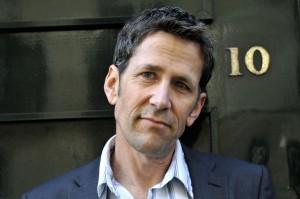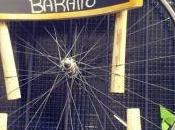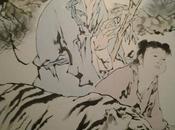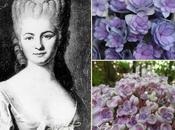
Quindi è con immenso piacere che vi presento l’intervista sia nella versione tradotta in italiano, sia in quella originale (per chi volesse leggerla in lingua) VERSIONE ITALIANA | English version
1) Chi ti segue da tempo ti conosce come uno scrittore di thriller. Come mai hai scelto di allontanarti da un genere che ti ha fatto vincere anche premi importanti (come l’Edgar nel 2006)?
Jess Walter: Quando scrivo non penso al genere, scrivo semplicemente la prossima storia che voglio leggere. Ho iniziato a scrivere “Beautiful Ruins” prima di tutti gli altri miei romanzi. Mi ci sono voluti quasi quindici anni per terminarlo. In quello stesso periodo, ho scritto un paio di libri che si potrebbero definire thriller, ma ho anche scritto romanzi a fumetti, racconti e fiction letterarie, anche poesie. E’ la storia che detta sua forma.
2) Hai mai dovuto affrontare il blocco dello scrittore? Come ne sei uscito?
J.W.: Certamente! Capita a ogni scrittore. Non ci penso troppo, però. Mi metto alla scrivania e scrivo. Mio padre ha lavorato per 35 anni in una fabbrica di alluminio e non poteva permettersi il lusso di darsi malato perché “era bloccato”. Ecco perché sto alla scrivania e passo a qualcos’altro. Ad essere bloccata è l’opera in sé, non lo scrittore. Probabilmente è per questo che sono in grado di approcciare stili differenti.
3) Da dove prende l’ispirazione per i suoi romanzi? È legata a qualcosa in particolare come un posto, una canzone, una persona?
J.W.: Penso che la mia ispirazione venga dalle storie stesse. Mi interesso ai personaggi, al linguaggio, al piacere puro che si ricava dalla lettura. Seguo la storia come fa un lettore, solo che io la sto scrivendo. Mi piace perdermi in un libro, sia che sia scritto da un altro autore sia che sia scritto da me.
4) Cosa ti ha spinto a scegliere l’Italia come ambientazione per il tuo nuovo romanzo? E perché proprio le Cinque Terre?
J.W.: Ho sposato una donna italiana di seconda generazione e abbiamo visitato l’Italia per la prima volta nel 1997. Aveva famiglia a Roma, Milano e nei pressi di Ancona, abbiamo visto tutto il paese e me ne sono innamorato. Abbiamo visitato le Cinque Terre nel mese di febbraio, durante un temporale, e ho voluto scrivere di un posto tagliato fuori dal mondo, in un tempo lontano, quando ancora non era invaso dai turisti americani; così ho inventato un piccolo villaggio lì vicino. La storia è diventata una fantasia: l’idea di un romanzo rosa (romance), di Hollywood, la fantasia dello scrittore dallo stampo Hemingwayano in Europa. E l’Italia era il posto perfetto per tutto questo, soprattutto la costa ligure, che ha ispirato tanti scrittori. Sono tornato di nuovo nel 2007 per tenere una conferenza agli studenti americani che studiano a Firenze, e ho proseguito così la mia ricerca. La gente, il paesaggio, il cibo, la cultura, il ritmo: adoro l’Italia.
5) Come si è svolto lo straordinario lavoro di ricerca che sta alla base del libro (dalle frasi in italiano, ai luoghi visitati, ai cenni storici sul cinema e il film “Cleopatra”)?
J.W.: Ho una formazione giornalistica. Quando faccio ricerche per un romanzo mi approccio come se dovessi fare ricerche per una rivista o un giornale, andando sul posto ed intervistando persone, nonché leggendo ogni cosa sull’argomento. Quindi ho chiesto ai pescatori cosa stavano pescando, agli albergatori che tipo di zuppa stavano servendo. Inoltre ascoltavo le conversazioni, disegnavo sul mio diario e assorbivo l’essenza del posto. Cerco di immergermi completamente. Quanto ai modi di dire alla fine ho assunto un professore americano di italiano, che mi ha aiutato con la traduzione, perché il mio italiano is “molto brutto” (in italiano nell’intervista). Ho anche avuto corrispondenze con un professore italiano d’inglese, che era un fan dei miei primi libri e che mi ha aiutato a perfezionare ulteriormente le traduzioni.
6) Il suggestivo fortino della seconda guerra mondiale descritto ne “L’odore dolce dei ricordi” esiste realmente o è frutto della tua immaginazione come il paesino di Porto Vergogna?
J.W.: Quando sono tornato nelle Cinque Terre, nel 2007, ho visto un fortino mentre stavo facendo un’escursione. Naturalmente non c’erano dipinti all’interno. Ma, come scrivevo nel mio diario, mi sembrava un modo per introdurre un’altra forma d’arte ( il libro è, in qualche modo, una meditazione sui diversi modi in cui gli artisti esprimono le loro storie – scrivendo, suonando, recitando e… dipingendo ). La cosa che preferisco quando scrivo romanzi è inventare: immaginare, per esempio, interi villaggi e alberghi e sensibili pittori nazisti.
7) Il tuo romanzo si presenta come un’insieme di voci narranti, diversi tempi di narrazione e altrettante tipologie di narrazione (si passa dal passato al presente, al capitolo di un romanzo, all’opera teatrale, alla sceneggiatura di un film). Come mai questa scelta? Non trova che l’effetto potrebbe essere un po’ confusionario?
J.W.: Il romanzo rappresenta il modo in cui lavoro. Passo per un gran numero di forme e stili. È sempre la storia a dettare lo stile, per me. Uno dei temi di questo romanzo è la narrativa stessa, il modo in cui le persone, e in particolar modo gli artisti, si impegnano nel raccontare la vita così come loro stessi la vivono. Come scrittore, mi piace lanciarmi delle sfide, e ho pensato che avrei potuto dare al libro una sorta di risonanza se avessi costruito il racconto con brani incompleti ( un po’ di romanzo , un pizzico di diario , parte dell’idea di un film e di un’opera teatrale) … In questo modo , il libro si compone di manufatti, o rovine, le “Beautiful Ruins” del titolo inglese.
8) Quanta critica sociale c’è alla base del romanzo nei riguardi del moderno business che gira intorno a cinema e tv e quanto invece c’è di “romanzato” nella Hollywood da te descritta?
J.W.: La satira è una delle mie forme preferite di scrittura – Joseph Heller, Voltair e Kurt Vonnegut sono stati fra i miei primi eroi letterari. Adoro quel tipo di satira che ritorna sui suoi passi per riscoprire il suo feeling originario. Io credo che uno scrittore dovrebbe contemplare la cultura intorno a sé, per esistere nel proprio tempo – e nel mio tempo c’è così tanto su cui far satira. Come Hollywood, che è un ottimo specchio, in grado di riflettere un’immagine del nostro meglio e del nostro peggio.
9) Il personaggio fittizio di Michael Deane, agente narcisista e senza scrupoli, è stato ispirato da qualcuno in particolare o è totalmente frutto della tua immaginazione?
J.W.: No, è completamente frutto della mia fantasia. Di certo non c’è carenza di produttori e presidenti degli studios molto appariscenti, ma Micheal Deane è stato completamente inventato.
10) Il film tratto da “Beautiful Rovine” sarà presto in lavorazione (le riprese inizieranno a maggio). Ci può dare delle news a riguardo? E’ contento finora del cast scelto?
J.W.: Dovrebbero girare in una location a Roma, e da qualche parte sulla costa Italiana nel mese di maggio. L’ attrice inglese Imogen Poots è stata scelta per il ruolo di Dee Moray, ma queste sono tutte le notizie che ho. Ho scritto la sceneggiatura insieme al meraviglioso regista Todd Field, e adoro la sua visione per il film, che sarà immersa nel 1960 fra l’Italia e la vecchia Hollywood.
11) E infine, l’ultima domanda, un pochino diversa dalle altre. Essendo il nostro un sito di lettori, ma anche di aspiranti scrittori, vorremmo chiederti: che consigli daresti a chi vorrebbe approcciarsi al mestiere dello scrittore?
J.W.: (Questo è il consiglio che do sempre: ) Scrivete tutto il tempo. Leggete tutto il tempo. Siate pazienti. Siate audaci. Siate umili. Siate fiduciosi. Non cedete alla voglia di finire subito e emergete dalla banalità della cultura. Non cedete alla gelosia, alla commercialità, o alla paura. Fate volontariato, o allenate bambini, o siate un Big Brother o una Big Sister (ndr http://www.bbbs.org/site/c.9iILI3NGKhK6F/b.5962335/k.BE16/Home.htm), o qualcosa di questo tipo. Qualunque cosa vi permetta di uscire dalla vostra testa ed evitare il narcisismo autoriale. E qualunque cosa facciate, non accettate mai consigli da altri autori.
Grazie.
J.W.: Grazie Mille – (in italiano nell’intervista)
VERSIONE INGLESE | Versione italiana
1) You usually write thrillers and the readers who follow you and your work appreciate them very much. Why did you choose to leave a genre which granted you many significant prizes such as the Edgar Award?
Jess Walter: I don’t think about genre when I’m writing. I just write the next story I want to read. I started writing “Beautiful Ruins” before any of my other novels. It took me almost fifteen years to finish. In that time, I’ve written a couple of books you could call thrillers, but I also wrote comic novels, short stories and literary fiction, even poetry. The story dictates its form.
2) Have you ever suffered from the writer’s block? How did you manage to overcome it?
J.W.: Oh sure. Every writer does. I don’t indulge it much, though. I stay at the desk and work. My dad worked for 35 years at an aluminum factory and he couldn’t call in sick because he “was blocked.” So I stay at the desk and I switch to something else. The work itself gets stuck, not the writer. It’s probably how I am able to write in so many different styles.
3) Where do you get your inspiration from? Is it something which has to do with a particular place, or song, or a person maybe?
J.W.: I think my inspiration comes from the stories themselves. I get interested in the characers, in the language, in the pure pleasure that one gets from reading. I’m following the same story as the reader; I just happen to be writing it. I love getting lost in a book, whether another author is writing it or me.
4) Why did you choose Italy and the Cinque Terre as a scenery for your novel? We’ve read in previous interviews and in the acknowledgements in your book that you visited our country. How did you like it?
J.W.: I married a second-generation Italian woman and we visited Italy first in 1997. She had family in Rome and Milan and near Ancona and we saw the whole country and I fell in love with it. We visited the Cinque Terre in February, in a rainstorm and I wanted to write about a place cut off from the world in a time before it was overrun by American tourists, so I invented a small village near there. The story became about fantasy: the ideas of romance and Hollywood and the fantasy of the Hemingwayesque writer in Europe, and Italy was the perfect place for these—especially the Ligurian coast, which has inspired so many writers. I came back again in 2007 to lecture to American students studying in Florence, and I returned to my research. The people, the scenery, the food, the culture, the pace—I adore Italy.
5) How did you carry out the amazing research work behind the novel (from the Italian sentences to the visited places, to the historical mentions about cinema and the movie “Cleopatra”)?
J.W.: I was a journalist by training. When I’m researching a novel, I begin just like I’m researching a story for a magazine or a newspaper, by going to a place and interviewing people and reading everything I can about it. So I asked fishermen what they were catching and I asked hoteliers what kind of soup they were serving. I also listen to conversations and draw in my journal and soak up the essence of a place. I try to immerse myself. With the sentences, I ended up hiring an American professor of Italian to help translate because my Italian is molto brutto. I also corresponded with an Italian English professor who was a fan of my earlier books and helped me with the last round of translations.
6) Does the Second World War evocative pillbox described in “L’odore dolce dei ricordi” (Beautiful Ruins) really exist or is it a figment of your imagination, just like Porto Vergogna?
J.W.: When I returned to the Cinque Terre in 2007 I saw a pillbox while I was hiking. Of course, there were no paintings inside. But as I was writing in my journal, it seemed like a way to bring in another art form (the book is, in some ways, a meditation on the various ways artists express their stories—writing, playing music, acting and … painting). My favorite part of writing fiction is inventing—imagining whole villages and hotels and sensitive Nazi painters.
7) Your novel is a combination of narrative voices, different narrative times and methods (we move from the past to the present, to a novel chapter, to a theater piece, to a screenplay). How did you choose which style to adopt for each chapter? Which difficulties did you have to cope with, in order not to confuse the reader?
J.W.: The novel represents the way I work. I jump around a lot in forms and styles. The story always dictates the style for me. One of the subjects of this novel is storytelling itself—the way in which people, especially artists, engage in the telling of their lives as they live them. I like to give myself challenges as a writer, and I thought it would give the book a kind of resonance if I could construct the narrative of incomplete pieces (a bit of a novel, a bit of a memoir, part of a movie pitch and a play) … In this way, the book is made up of artifacts, or ruins, the Beautiful Ruins of the title.
8) How much of social criticism against modern business around cinema and television and how much of the fictionalized Hollywood is there in your novel?
J.W.: Satire is my one of favorite forms of writing—Joseph Heller, Voltaire and Kurt Vonnegut were among my first literary heroes. I like that sort of satire that doubles back on itself and returns to genuine feeling. I feel like a writer should be contemplating the culture around him or her, to exist of your time—and in my time, there is much to mock, like Hollywood, which serve sas a mirror to reflect back to ourselves our very best and very worst.
9) Was the fictional character of Michael Deane, narcissistic and unscrupulous police officer, inspired by someone in particular or is he entirely a figment of your imagination?
J.W.: No, he was a figment of my imagination. There are certainly no shortage of larger-than-life producers and studio bosses but Michael Deane was entirely made-up.
10) The shooting of the movie based on your novel “Beautiful Ruins” will start soon (in may 2014). Is there any news? Are you happy with the cast up to now?
One more question, a little different from the other ones:
J.W.: They are supposed to be filming on location in Rome and somewhere on the coast of Italy in May. The British actress Imogen Poots has been cast as Dee Moray, but that’s all the news I have. I co-wrote the script with the wonderful director, Todd Field, and I really love his vision for the film, which will be steeped in 1960s Italy and old Hollywood.
11) Our website is a place for readers, but also for aspiring writers. We would like to ask you: what would you recommend to someone who wants to become a writer?
J.W.: (This is the advice I always give:) Write all the time. Read all the time. Be patient. Be bold. Be humble. Be confident. Don’t give in to the speed and surface banality of the culture. Don’t give in to jealousy, commerce, or fear. Do charity work, or coach kids, or be a Big Brother or Sister, or something. Whatever it takes to get out of your own head and avoid authorial narcissism. And whatever you do, don’t ever take advice from authors.
Thank you.
J.W.: Grazie Mille –







